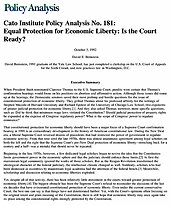That constitutional protection for economic liberty should have been a major focus of a Supreme Court confirmation hearing in 1991 is an extraordinary development in the history of American constitutional law. During the New Deal era, a liberal Supreme Court reversed dozens of precedents that had restricted the power of government to regulate economic activity. From that time until the late 1970s, there was almost unanimous agreement among legal scholars on both the left and the right that the Supreme Court’s pre-New Deal protection of economic liberty–stretching back for a century and a half–was a mistake that should never be repeated.
Beginning in the late 1970s, however, a few dedicated legal scholars began to revive the idea that the Constitution limits government power in the economic sphere and that the judiciary should enforce those limits.[2] At first the mainstream legal community ignored the works of those scholars. But as the Reagan Revolution transformed the ideological character of the federal judiciary, the intellectual climate changed as well. Suddenly, scholars who had been dismissed as eccentrics by mainstream legal academia had the attention of the federal bench.[3] Meanwhile, scholarship and discussion relating to economic liberties exploded.
Yet, despite all of that activity, there has been relatively little movement in the courts toward greater protection of economic liberty.[4] The biggest obstacle has been the Supreme Court’s refusal to reconsider the decisions of the last six decades that have eviscerated constitutional protection of economic liberty. Even under the current conservative Court, the best one can say is that things have not deteriorated further. Yet, with the Court’s opinions often focusing on the original intent and plain meaning of the Constitution, there is still hope that economic liberty may once again take its place among the constitutional rights strongly protected by the Constitution.


